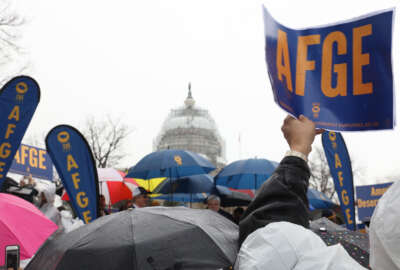
After some agencies restore federal unions’ official time, new House bill would eliminate it
Official time was sharply curtailed during the Trump administration. Now a Republican-backed bill in the House would eliminate official time.
Best listening experience is on Chrome, Firefox or Safari. Subscribe to Federal Drive’s daily audio interviews on Apple Podcasts or PodcastOne.
The Department of Veterans Affairs and other agencies have restored to federal employee unions so-called official time, or the right to do union business during regular working hours. Official time was sharply curtailed during the Trump administration. Now a Republican-backed bill in the House would eliminate official time. It’s called the Do Your Job Act of 2021. Good or bad idea? For one view, and the third in our four-part series, Federal Unions: For better or for worse, the Vice President of the National Right To Work Committee Greg Mourad spoke to Federal Drive with Tom Temin.
Interview transcript:
Tom Temin: Mr. Mourad, good to have you on.
Greg Mourad: Thanks Tom, good to be with you.
Tom Temin: So what is your view of this – good idea or bad idea – understanding that your organization tends to try to balance the power between labor and Industry with respect to certifying unions in the first place?
Greg Mourad: Yeah, our primary interest as an organization is making sure that individuals have the right to decide for themselves whether a union gets their money and gets their support. And ultimately, we’d like to see people free to decide for themselves whether to work under a union contract. At the federal level, yeah, we absolutely think this bill is a great idea. There is no reason in the world tax dollars should be spent paying for union activities, tax dollars should be spent on those services those dollars were intended and appropriated for and that is the mission of the various agencies and organizations of the federal government, not the mission of the union that exists in those places.
Tom Temin: As a practical matter, though, in a given agency, if you have ten, twenty, thirty, in the case of Veterans Affairs, maybe 150,000 unionized employees – in the grand scheme of things as a percentage of hours spent, is it worth arguing over, given the size of the agency and the overall budget?
Greg Mourad: Well, the last year that I have numbers for unions racked up a staggering 3.6 million hours of official time in 2016, and a total cost of the taxpayers of $177 million. How big a percentage that is of the entire multi-trillion dollar federal budget is not really relevant to me, that is $177 million of taxpayer money that is just being gifted to the unions.
Tom Temin: And so this bill, then would eliminate the idea of official time altogether. And what should the unions do then in that case, if that were to happen, how would they get their work done or would they have to do it nights and weekends?
Greg Mourad: Well, no, they don’t have to do it nights and weekends, but they do have to go off the federal clock when they do it. And so it’s a pretty simple arrangement, really, the union pays them for the time they spend doing union work, and the taxpayers pay them for the time they spend doing taxpayer work. And the systems are certainly flexible enough to let a guy clock out for a half a day if he needs to spend a half a day doing union work.
Tom Temin: Got it. And let’s broaden the question, because we are doing a series on this very question of the efficacy or utility of unions in the public sector in the first place. They’ve been around since, I guess, the Kennedy administration at the federal level, and they can’t so far bargain on wages and benefits. That’s a standard thing, regardless of whether you’re in a union or not. Do they have a place in the public sector, though? I think people still ask that question, regardless of how much history there is there.
Greg Mourad: Yeah. And they should ask that question. Federal workers have a First Amendment right to association, they can create unions, they can form unions. But there is really no place for a union to have any official status with the government its employees work for, they should not be bargaining a contract, they should not be adjudicated grievances, they should have no more standing than any other taxpayer, because it is the government and it is the public purse. And no private organization, not even a private organization consisting of the employees of that government, should have more say over how the public purse is spent than anybody else.
Tom Temin: And is there a conflict of interest, do you feel, in the non-union managers and I guess the elected officials when dealing with federal unions, because I’ll just put it this way, unions tend to vote one party over another. And so the party that favors the union, do they have a conflict of interest versus their responsibility to the public that they represent and that hired them?
Greg Mourad: Absolutely. And especially in the case where the union is bargaining, as it is in many states and localities, not so much at the federal level, the unions bosses have bragged about how they elect their own bosses. And then they get to sit on both sides of the bargaining table fleecing the taxpayers. It’s an absolute conflict of interest when you’re elected with union support, and then you’re supposedly having to negotiate with the union over how much their people are going to get paid. And therefore, how much dues that the union gets in order to support your next election. There’s no doubt that’s a conflict of interest.
Tom Temin: Yes, because in some of the highly unionized states, the actuarial liabilities that they have for union benefits and pensions are really greater than the revenue the state can generate when the bill comes due.
Greg Mourad: That’s exactly right. And it’s worse than that, the normal ERISA (Employee Retirement Income Security Act) standards don’t apply, though some of those pensions have been allowed to pretend that they’re going to get 8% rates of return in perpetuity. So even the numbers they have that are bad don’t even tell you how bad it is, in many cases. It’s an absolute train wreck out there, which is part of why in the last suppose COVID stimulus bill, most of which money was not for COVID stimulus, they were giving hundreds of billions of dollars to those irresponsible states, with those unfunded bloated union pensions negotiated by politicians elected by unions, across the bargaining table with the unions that elected them fleecing the taxpayers, going into unsustainable debt, and then coming to the rest of us in the responsible states saying we need a federal taxpayer.
Tom Temin: And getting back to the federal unions, which don’t bargain over pay and benefits, although that has been raised recently. That would seem to be an untenable situation, given the fact that they’re cheek by jowl with large workforces that are not unionized, that are just under the General Schedule system.
Greg Mourad: Yeah, it’s a terrible idea letting those unions bargain for pay or working conditions or anything else. It is absolutely unacceptable to let those unions have more power over the spending of the public purse than the Congress does, it’s an absurd idea.
Tom Temin: And given the role of unions as they stand now, in federal agencies, how would you alter it to make it more, I don’t know, reasonable, because this goes back and forth between administrations, Republican and Democrat, to deal with the unions as equal partners in the running of the agency on the Democratic side, and on the Republican side, they tend to try to push them away and deal directly with employees without going through the union. What should it be there so there’s some consistency?
Greg Mourad: Yeah, if I were making the policy, the unions of employees would be able to collect dues money from their voluntary employees who wanted to give dues money voluntarily, they would be able to spend that money lobbying the government like anybody else can, but that’s it. They wouldn’t be negotiating anything. They wouldn’t be interfering in the hiring and firing process. They wouldn’t be interfering in the discipline process. They would simply be another lobbyist. Another agency, one among many.
Tom Temin: Greg Mourad is vice president of the National Right to Work committee. Thank you very much.
Greg Mourad: Thank you, Tom. Pleasure to chat with you.
Copyright © 2024 Federal News Network. All rights reserved. This website is not intended for users located within the European Economic Area.
Tom Temin is host of the Federal Drive and has been providing insight on federal technology and management issues for more than 30 years.
Follow @tteminWFED
Related Stories





